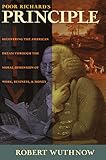Poor Richard's Principle : Recovering the American Dream through the Moral Dimension of Work, Business, and Money / Robert Wuthnow.
Material type: TextPublisher: Princeton, NJ : Princeton University Press, [1998]Copyright date: ©1996Edition: Course BookDescription: 1 online resource (448 p.)Content type:
TextPublisher: Princeton, NJ : Princeton University Press, [1998]Copyright date: ©1996Edition: Course BookDescription: 1 online resource (448 p.)Content type: - 9780691058955
- 9781400822201
- 306/.0973 20
- HN90.M6 W87 1996eb
- online - DeGruyter
- Issued also in print.
| Item type | Current library | Call number | URL | Status | Notes | Barcode | |
|---|---|---|---|---|---|---|---|
 eBook
eBook
|
Biblioteca "Angelicum" Pont. Univ. S.Tommaso d'Aquino Nuvola online | online - DeGruyter (Browse shelf(Opens below)) | Online access | Not for loan (Accesso limitato) | Accesso per gli utenti autorizzati / Access for authorized users | (dgr)9781400822201 |
Browsing Biblioteca "Angelicum" Pont. Univ. S.Tommaso d'Aquino shelves, Shelving location: Nuvola online Close shelf browser (Hides shelf browser)

|

|

|

|

|

|

|
||
| online - DeGruyter The Agony of the Russian Idea / | online - DeGruyter The Imperfect Union : Constitutional Structures of German Unification / | online - DeGruyter The Order of Terror : The Concentration Camp / | online - DeGruyter Poor Richard's Principle : Recovering the American Dream through the Moral Dimension of Work, Business, and Money / | online - DeGruyter Rethinking "Gnosticism" : An Argument for Dismantling a Dubious Category / | online - DeGruyter Paths of Fire : An Anthropologist's Inquiry into Western Technology / | online - DeGruyter Dissolution : The Crisis of Communism and the End of East Germany / |
Frontmatter -- CONTENTS -- ACKNOWLEDGMENTS -- Introduction. THE QUESTION OF MORAL RESTRAINT -- PART ONE. THE UNREALIZED AMERICAN DREAM -- Chapter One. HAVING IT ALL-AND WANTING MORE: THE SOCIAL SYMPTOMS OF CULTURAL DISTRESS -- Chapter Two. MAKING CHOICES: FROM SHORT-TERM ADJUSTMENTS TO PRINCIPLED LIVES -- Chapter Three. MORAL TRADITION: THE LOST AMBIVALENCE IN AMERICAN CULTURE -- PART TWO. THE CULTURAL CONSTRUCTION OF MATERIAL LIFE -- Chapter Four. SHIFTING PERSPECTIVES: THE DECOUPLING OF WORK AND MONEY -- Chapter Five. ACCOUNTS: THE CHANGING MEANINGS OF WHITE-COLLAR WORK -- Chapter Six. (NOT) TALKING ABOUT MONEY: THE SOCIAL SOURCES AND PERSONAL CONSEQUENCES OF SUBJECTIVIZATION -- Chapter Seven. GETTING AND SPENDING: THE MAINTENANCE AND VIOLATION OF SYMBOLIC BOUNDARIES -- Chapter Eight. THE WORKING CLASS: CHANGING CONDITIONS AND CONVERGING PERSPECTIVES -- PART THREE. THE PRECARIOUS SOURCES OF HUMAN VALUES -- Chapter Nine. FAMILY LIFE: THE NEW CHALLENGES OF BALANCING MULTIPLE COMMITMENTS -- Chapter Ten. REDISCOVERING COMMUNITY: THE CULTURAL POTENTIAL OF CARING BEHAVIOR AND VOLUNTARY SERVICE -- Chapter Eleven. THE QUEST FOR SPIRITUALITY: AMBIGUOUS VOICES FROM AMERICA'S RELIGIOUS COMMUNITIES -- PART FOUR. THE LANGUAGES OF MORAL DISCOURSE -- Chapter Twelve. MATERIALISM AND MORAL RESTRAINT: THE ROLE OF ASCETIC AND EXPRESSIVE VALUES -- Chapter Thirteen. THE POSSIBILITIES OF MORAL DISCOURSE: LIMITATIONS, ATHOLOGIES, AND CHALLENGES -- METHODOLOGY -- NOTES -- INDEX
restricted access online access with authorization star
http://purl.org/coar/access_right/c_16ec
The American Dream is in serious danger, according to Robert Wuthnow--not because of economic conditions, but because its moral underpinnings have been forgotten. In the past this vision was not simply a formula for success, but a moral perspective that framed our thinking about work and money in terms of broader commitments to family, community, and humanitarian values. Nowadays, we are working harder than ever, and yet many of us feel that we are not realizing our higher aspirations as individuals or as a people. Here Wuthnow examines the struggles in which American families are now engaged as they try to balance work and family, confront the pressures of consumerism, and find meaning in their careers. He suggests that we can find economic instruction and inspiration in the nation's past--in such figures as Benjamin Franklin, for instance, who was at once the prudent Poor Richard, the engaged public person, and the enthusiastic lover of life. Drawing on first-hand accounts from scores of people in all walks of life and from a national survey, the book shows that work and money cannot be understood in terms of economic theories alone, but are inevitably rooted in our concepts of ourselves and in the symbolic rituals and taboos of everyday life. By examining these implicit cultural understandings of work and money, the book provides a foundation for bringing moral reasoning more fully to bear on economic decisions. It re-examines the moral arguments that were prominent earlier in our history, shows how these arguments were set aside with the development of economistic thinking, and suggests their continuing relevance in the lives of people who have effectively resisted the pressures of greater financial commitments. Demonstrating that most Americans do bring values implicitly to bear on their economic decisions, the book shows how some people are learning to do this more effectively and, in the process, gain greater control over their work and finances. At a time when policymakers are raising questions about the very survival of the American dream, Poor Richard's Principle offers an analysis of how moral restraint can once again play a more prominent role in guiding our thinking.
Issued also in print.
Mode of access: Internet via World Wide Web.
In English.
Description based on online resource; title from PDF title page (publisher's Web site, viewed 30. Aug 2021)


